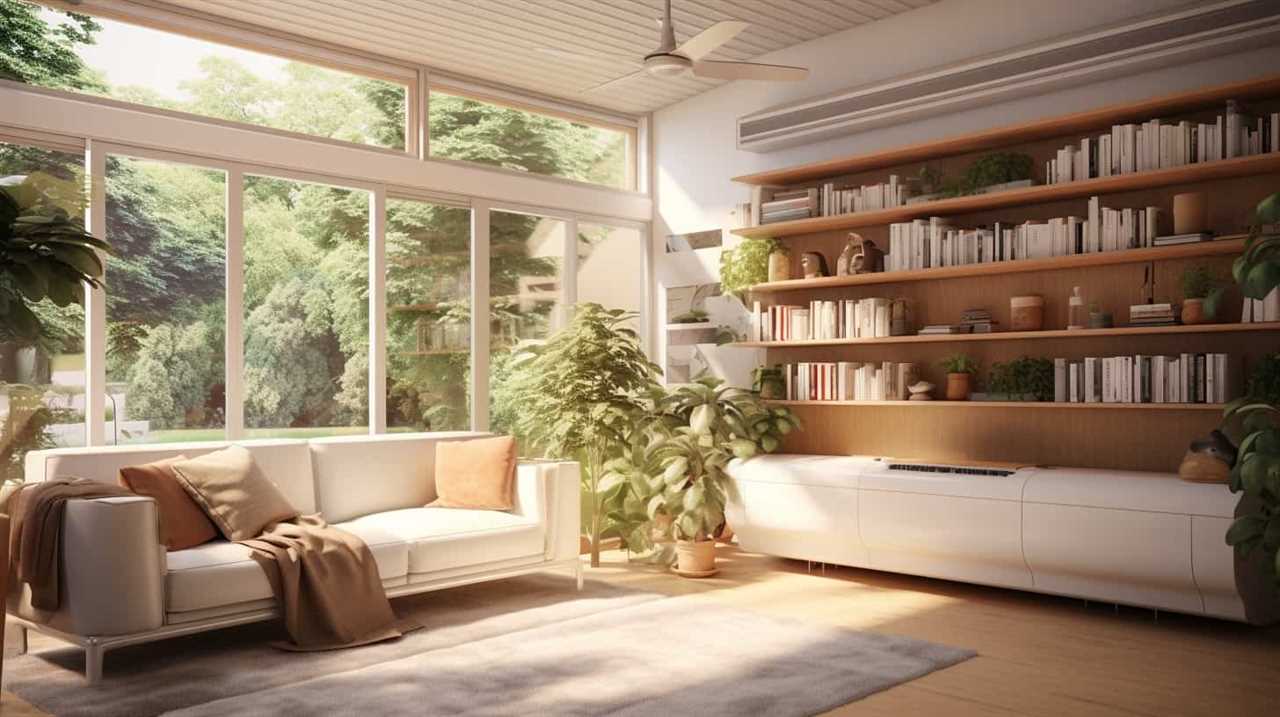Fed up with exorbitant energy costs? We’ve got an answer for you!
With efficient heat pumps, you can slash your energy bills and save money while keeping your home comfortable.
In this article, we’ll show you how to choose the right heat pump for your home, maximize energy savings through proper installation, and debunk common myths about heat pumps and energy efficiency.
Get ready to enjoy lower energy bills and a more efficient home!
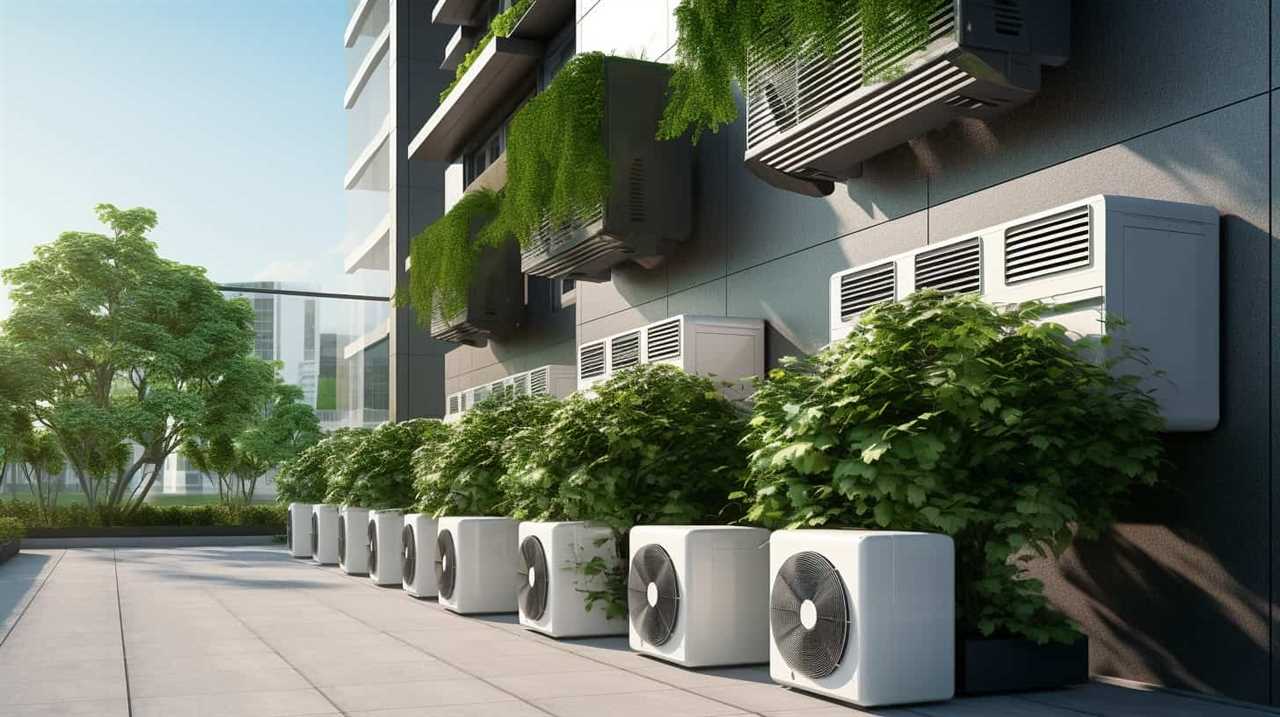
Key Takeaways
- Efficient heat pumps bring substantial savings on energy bills.
- Heat pumps do not rely on burning fossil fuels, reducing carbon footprint.
- Proper installation is crucial for optimizing heat pump performance and reducing energy costs.
- Choosing a heat pump with a high EER maximizes energy efficiency.
The Benefits of Efficient Heat Pumps
We love efficient heat pumps because they bring us substantial savings on our energy bills. Heat pump technology is designed to efficiently convert energy from the air or ground into heat, providing reliable and cost-effective heating for our homes.
Unlike traditional heating systems, heat pumps don’t rely on burning fossil fuels, which reduces our carbon footprint and helps protect the environment. By using renewable energy sources, heat pumps contribute to the global efforts in reducing greenhouse gas emissions.
Additionally, efficient heat pumps are also capable of providing cooling during hot summer months, making them a versatile solution for year-round comfort.
Now that we understand the benefits of efficient heat pumps, let’s explore how to choose the right one for your home.
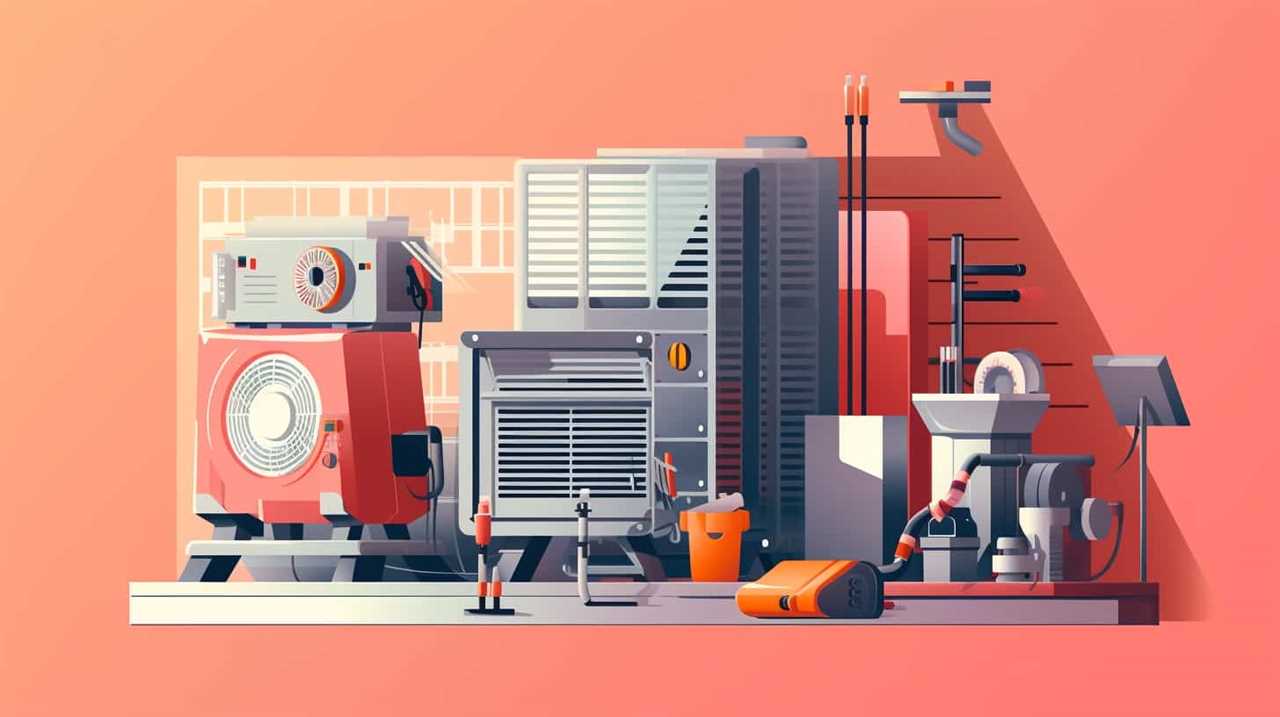
How to Choose the Right Heat Pump for Your Home
To ensure we select the most suitable heat pump for our homes, it’s important to carefully consider both the size and efficiency of the unit. Here are four tips to help us choose the right heat pump:
-
Determine the correct size: It’s crucial to calculate the heating and cooling needs of our home to determine the appropriate size of the heat pump. A unit that’s too small will struggle to maintain the desired temperature, while an oversized unit will waste energy and lead to higher bills.
-
Look for high efficiency ratings: Heat pumps are rated for efficiency using the Seasonal Energy Efficiency Ratio (SEER) and Heating Seasonal Performance Factor (HSPF). Higher ratings indicate better energy efficiency, so aim for units with high SEER and HSPF values.
-
Check for ENERGY STAR certification: Choosing a heat pump with the ENERGY STAR label ensures that it meets strict energy efficiency guidelines set by the U.S. Environmental Protection Agency. These units can significantly reduce energy consumption and save us money in the long run.

-
Consider additional features: Some heat pumps come with advanced features like variable-speed compressors, programmable thermostats, and smart technology integration. These can enhance comfort, improve energy efficiency, and provide better control over temperature settings.
Maximizing Energy Savings With Proper Heat Pump Installation
To achieve maximum energy savings, it’s important to properly install our heat pump and ensure that all components are correctly aligned and functioning. Avoiding common heat pump installation mistakes is crucial for optimizing heat pump performance and reducing energy costs.
One common mistake is improper sizing, which can lead to inefficiency and increased energy consumption. It’s essential to accurately calculate the heating and cooling load requirements of our home to determine the appropriate size of the heat pump.
Another mistake to avoid is improper refrigerant charging, as undercharging or overcharging can negatively impact the system’s efficiency.
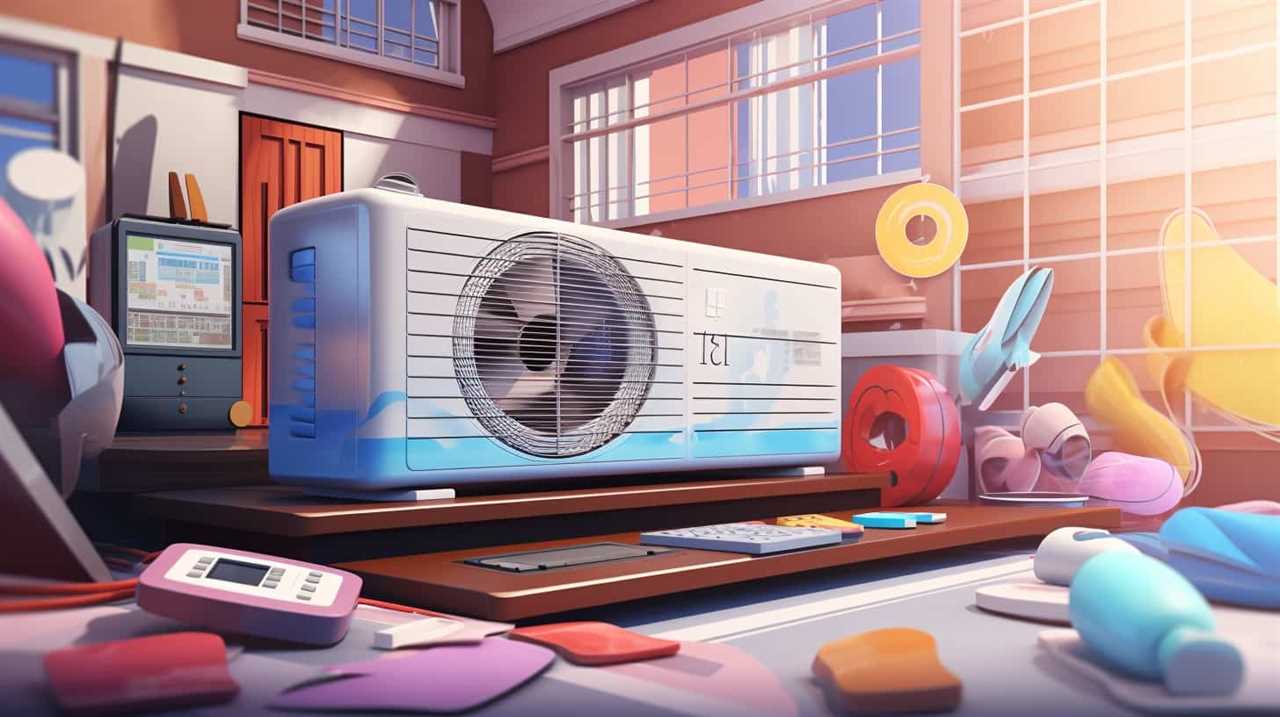
Additionally, ensuring proper airflow and ductwork design is vital for optimal heat pump performance.
Understanding the Energy Efficiency Ratio (Eer) of Heat Pumps
Let’s start by understanding the Energy Efficiency Ratio (EER) of heat pumps. The EER is a simple measure that tells us how efficiently a heat pump can cool a space.
It’s important to look for a high EER rating when choosing a heat pump, as a higher EER means greater energy efficiency and potential savings on your energy bills.
When comparing different heat pumps, comparing their EER ratings can help you make an informed decision on which one will be the most efficient for your home.
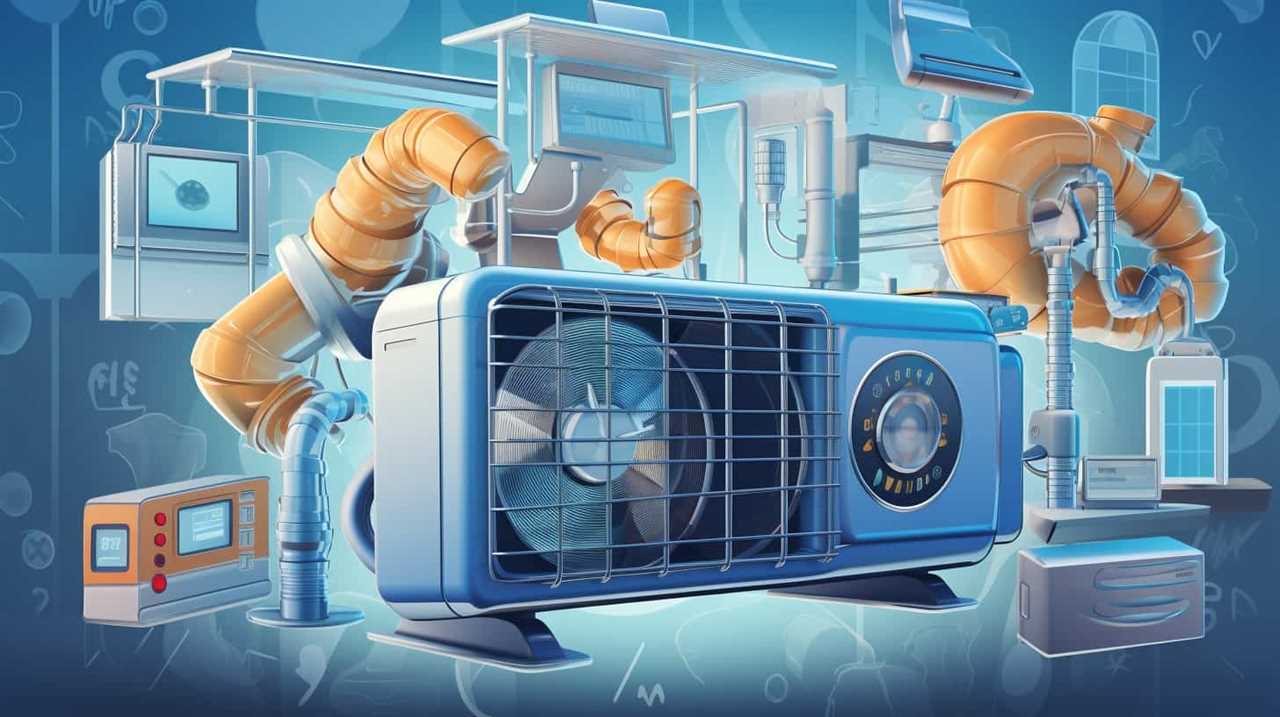
EER Explained Simply
We can easily understand the Energy Efficiency Ratio (EER) of heat pumps by simplifying its explanation. The EER is a measurement that helps determine the energy efficiency of a heat pump. It’s calculated by dividing the cooling capacity of the heat pump in British thermal units (BTU) per hour by the power input in watts.
Here are four key points to help you grasp the concept of EER:
-
EER Definition: The EER is a ratio that indicates how efficiently a heat pump can cool a space when compared to the amount of energy it consumes.
-
EER Calculation: To calculate the EER, divide the cooling capacity (in BTU/hr) by the power input (in watts).
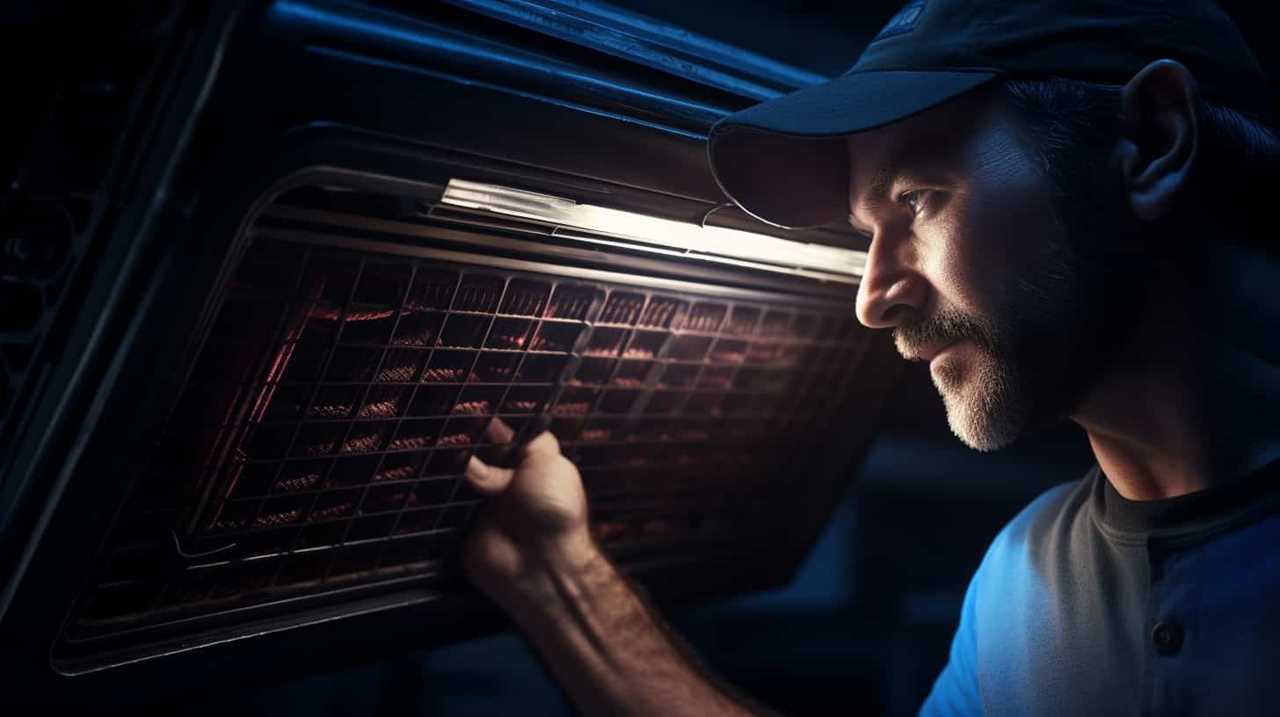
-
Higher EER, Better Efficiency: A higher EER value means the heat pump is more efficient, as it can cool a space using less energy.
-
Energy Savings: By choosing a heat pump with a higher EER, you can save money on your energy bills by using less electricity for cooling.
Understanding the EER of heat pumps can help you make informed decisions when selecting an energy-efficient option that will save you money in the long run.
Importance of High EER
Choosing a heat pump with a high EER is crucial for maximizing energy efficiency and reducing utility costs. The Energy Efficiency Ratio (EER) measures the cooling capacity of a heat pump divided by the power it consumes. A higher EER indicates greater energy efficiency, meaning the heat pump can provide the same amount of cooling while using less electricity.
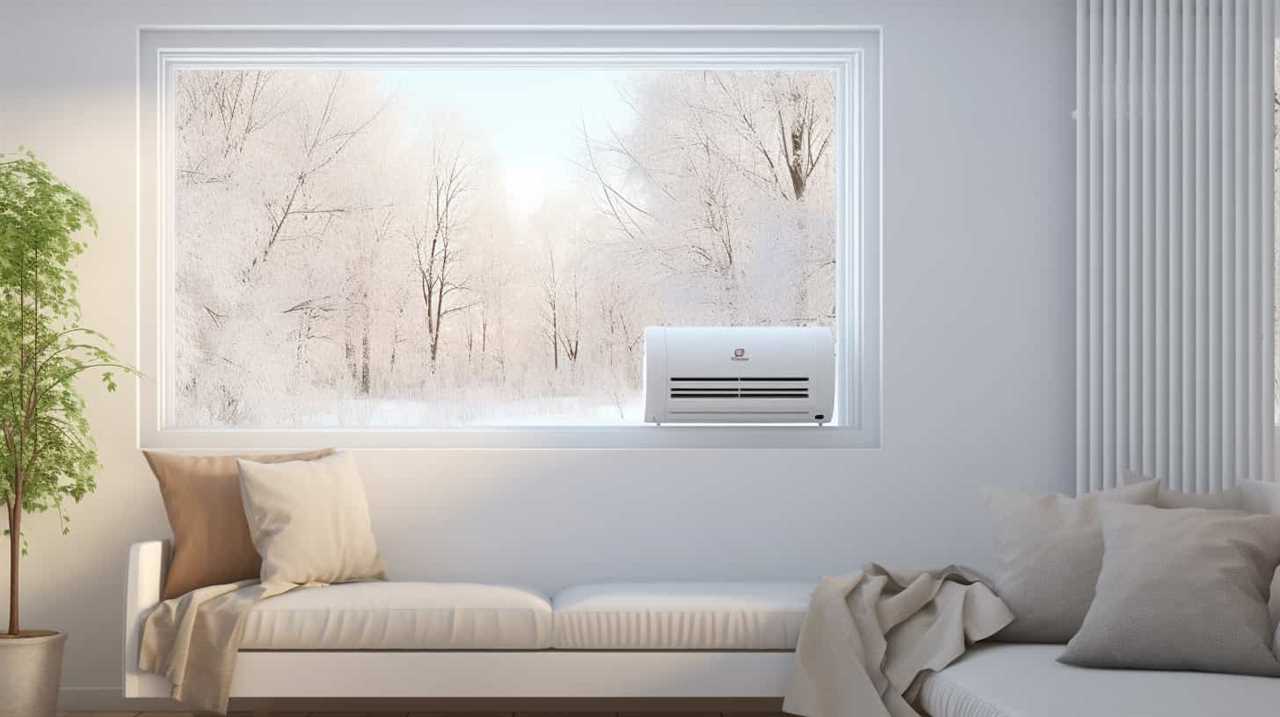
This not only saves money on energy bills but also reduces the environmental impact. However, there are some misconceptions about energy efficiency and heat pumps. People often think that higher EER models are always more expensive, but this isn’t necessarily true. In fact, investing in a high EER heat pump can lead to long-term savings, as the reduced energy consumption will offset the initial cost.
Additionally, high EER heat pumps often come with advanced features and technologies that further enhance their performance and efficiency.
Comparing Different EER Ratings
When comparing different EER ratings of heat pumps, it’s important to consider the energy efficiency ratio as a measure of cooling capacity divided by power consumption. Understanding EER ratings can help you make an informed decision when choosing a heat pump. Here are some key factors to consider:
- Higher EER ratings indicate better energy efficiency, meaning the heat pump will provide more cooling for less power consumption.
- Look for heat pumps with EER ratings that meet or exceed the minimum efficiency standards set by regulatory bodies.
- Consider the size of your space and the cooling needs when comparing EER ratings. A higher EER rating may be more beneficial for larger areas or areas with higher cooling requirements.
- Don’t forget to consider the initial cost of the heat pump and any potential long-term energy savings when comparing EER ratings.
Common Myths About Heat Pumps and Energy Efficiency
Let’s address some common myths about heat pumps and energy efficiency.
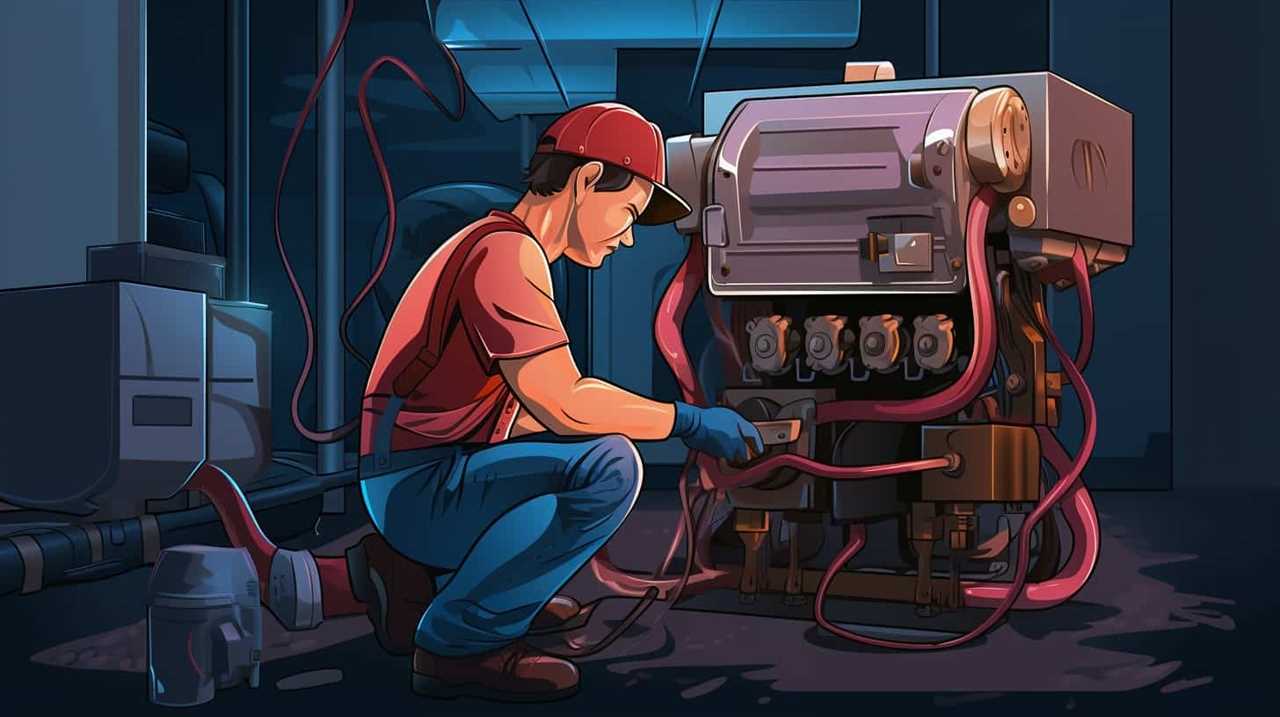
There are misconceptions that heat pumps aren’t as effective as traditional heating systems, or that they’re only suitable for warmer climates. However, the truth is that modern heat pumps are highly efficient and can save you a significant amount of energy and money.
Heat Pump Misconceptions
We have identified three common myths about heat pumps and energy efficiency. Let’s debunk these misconceptions and provide you with accurate information:
-
Myth: Heat pump maintenance is expensive and time-consuming.
Fact: While regular maintenance is necessary to ensure optimal performance, it doesn’t have to be costly or time-consuming. Simple tasks like regularly cleaning or replacing air filters can significantly improve efficiency and extend the lifespan of your heat pump. -
Myth: Heat pumps aren’t cost-effective.
Fact: Heat pumps are highly efficient and can save you money on your energy bills. Although the upfront cost may be higher compared to other heating systems, the long-term savings in energy costs make them a cost-effective option.
-
Myth: Heat pumps don’t work well in cold climates.
Fact: Modern heat pumps are designed to work efficiently in cold climates. With advancements in technology, heat pumps can effectively heat your home even in freezing temperatures. -
Myth: Heat pumps only provide heating.
Fact: Heat pumps can both heat and cool your home. They offer the benefits of both a heating and cooling system, providing year-round comfort.
Energy-Saving Heat Pumps
By debunking common myths about heat pumps and energy efficiency, we can better understand the potential for energy-saving heat pumps. Many people believe that heat pumps are not energy efficient and do not contribute to reducing their carbon footprint. However, this is far from the truth. Heat pumps are actually one of the most energy efficient cooling options available on the market. They work by transferring heat from one area to another, rather than generating heat. This means that they use significantly less energy compared to traditional cooling systems. In fact, heat pumps have the potential to reduce your carbon footprint by up to 50%. Take a look at the table below to see the energy savings potential of heat pumps compared to other cooling systems:
| Cooling System | Energy Efficiency Ratio (EER) |
|---|---|
| Heat Pump | 13-22 |
| Central AC | 10-14 |
| Window AC | 8-12 |
As you can see, heat pumps have a higher energy efficiency ratio (EER) compared to other cooling systems, making them a great choice for those looking to reduce their energy consumption and carbon footprint.
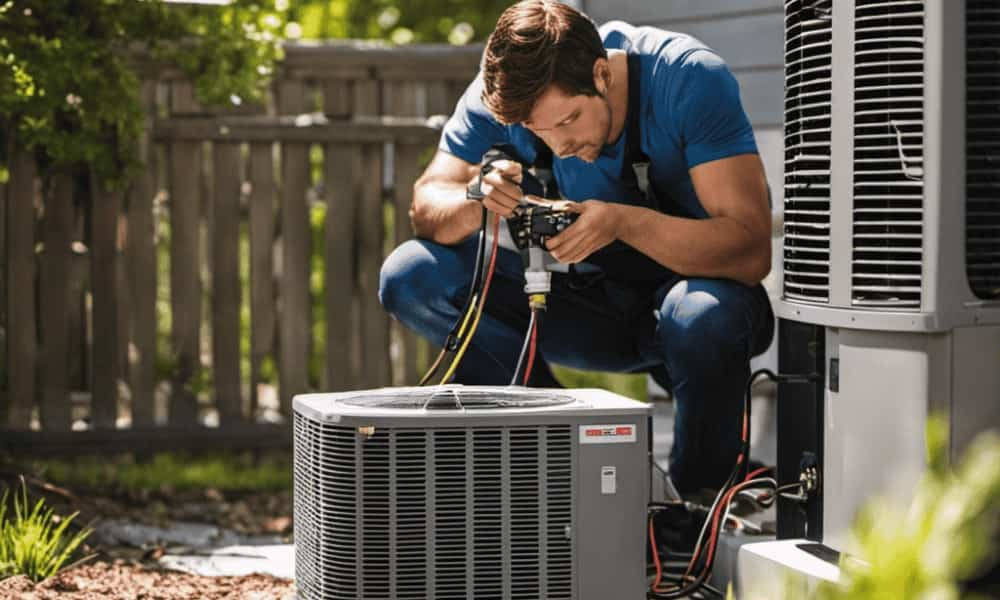
Tips for Maintaining and Optimizing the Energy Efficiency of Your Heat Pump
Maintaining and optimizing the energy efficiency of your heat pump requires regular cleaning and servicing. By following these simple tips, you can ensure that your heat pump operates at its maximum efficiency, saving you energy and money:
-
Clean or replace the air filters regularly: Clogged filters restrict airflow, making your heat pump work harder and consume more energy. Clean or replace the filters every 1-3 months.
-
Schedule professional maintenance annually: A qualified technician will inspect and clean the internal components, check refrigerant levels, and ensure optimal performance.
-
Keep the outdoor unit clear: Remove any debris, leaves, or plants that may obstruct airflow around the outdoor unit. This will help maintain proper heat exchange and prevent the system from overworking.

-
Use programmable thermostats: Set your thermostat to lower temperatures when you’re not home or during nighttime. This way, you can reduce energy consumption without sacrificing comfort.
Following these maintenance tips won’t only improve the energy efficiency of your heat pump but also extend its lifespan, ensuring reliable heating and cooling for years to come.
Frequently Asked Questions
Can Heat Pumps Be Used in Any Type of Home, or Are There Specific Requirements?
Heat pumps can be used in any type of home, but there are specific requirements. Factors like heat pump installation costs and maintenance requirements need to be considered.
Are Heat Pumps Noisy When They Are Running?
When heat pumps are running, they do produce some noise. However, the benefits of heat pumps compared to traditional heating systems, such as lower energy bills, make them a worthwhile investment. To choose the right size heat pump for your home, consult a professional.
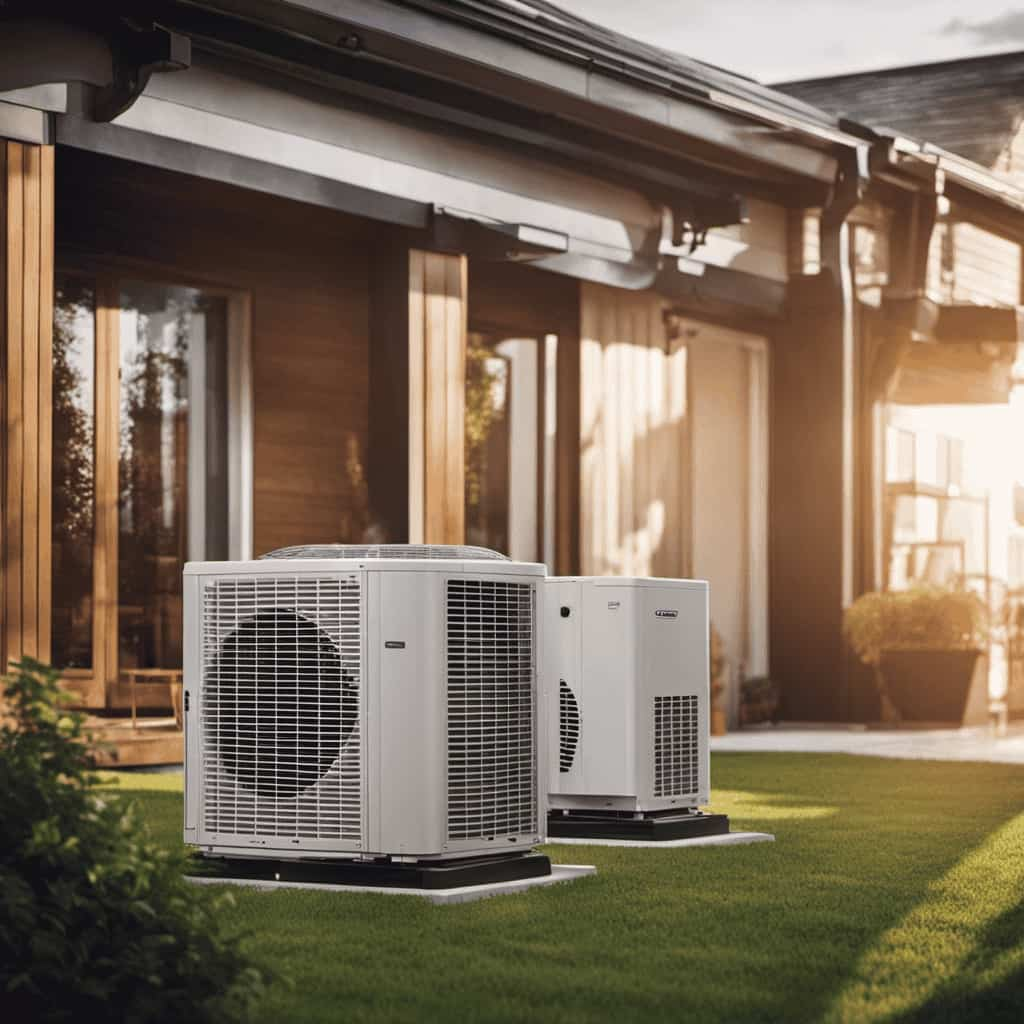
Do Heat Pumps Work Well in Cold Climates?
In cold climates, heat pumps work well to efficiently heat homes and can help slash energy bills. While they don’t require a lot of maintenance, the cost of installing a heat pump in a home can vary.
Are There Any Government Rebates or Incentives Available for Purchasing and Installing a Heat Pump?
There are government rebate programs and tax incentives available for purchasing and installing a heat pump. These incentives can help reduce the cost and make it more affordable to slash your energy bills with an efficient heat pump.
How Long Does a Heat Pump Typically Last Before It Needs to Be Replaced?
Heat pumps typically last around 15-20 years before needing replacement. Regular heat pump maintenance and being aware of signs of a failing heat pump, such as decreased efficiency and strange noises, can help prolong its lifespan.
Conclusion
In the world of energy conservation, efficient heat pumps are like a magician’s wand, effortlessly slashing your energy bills. By choosing the right heat pump for your home and ensuring proper installation, you can maximize your savings.
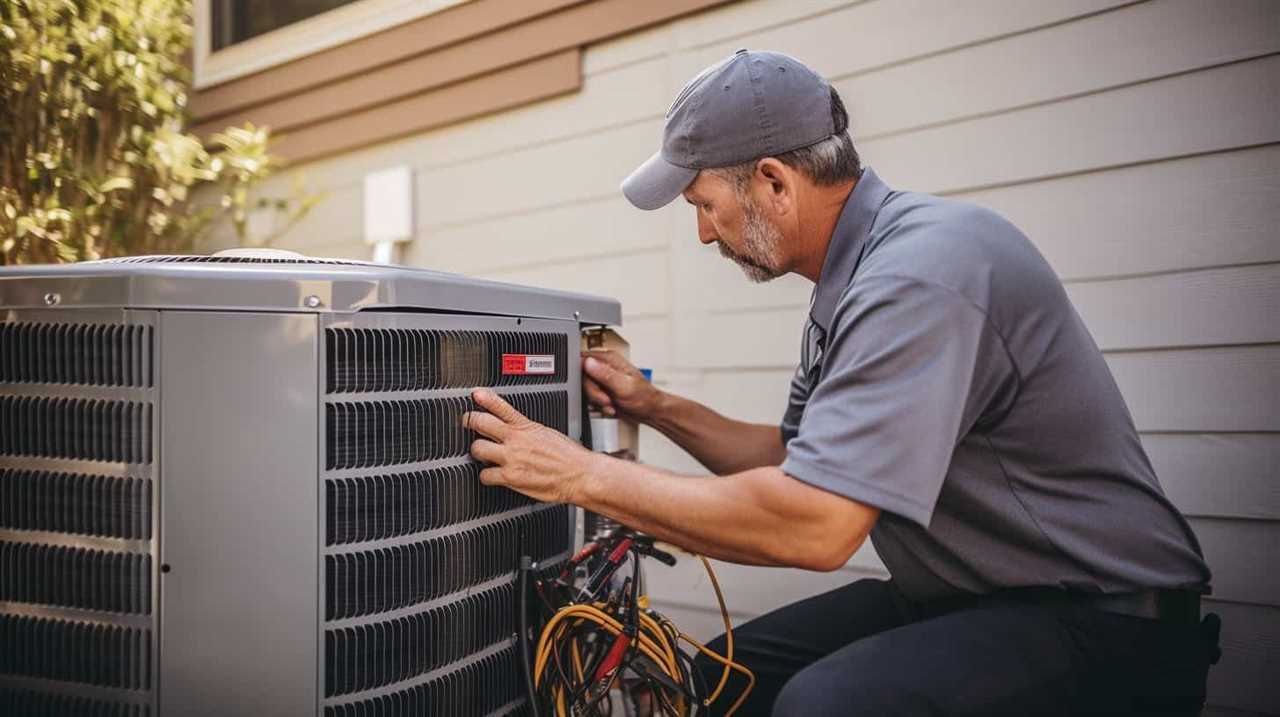
Don’t be fooled by common myths surrounding heat pumps; they’re a reliable and energy-efficient option.
With a little maintenance and optimization, your heat pump can continue to perform its magic, keeping your home cozy while saving you money.




